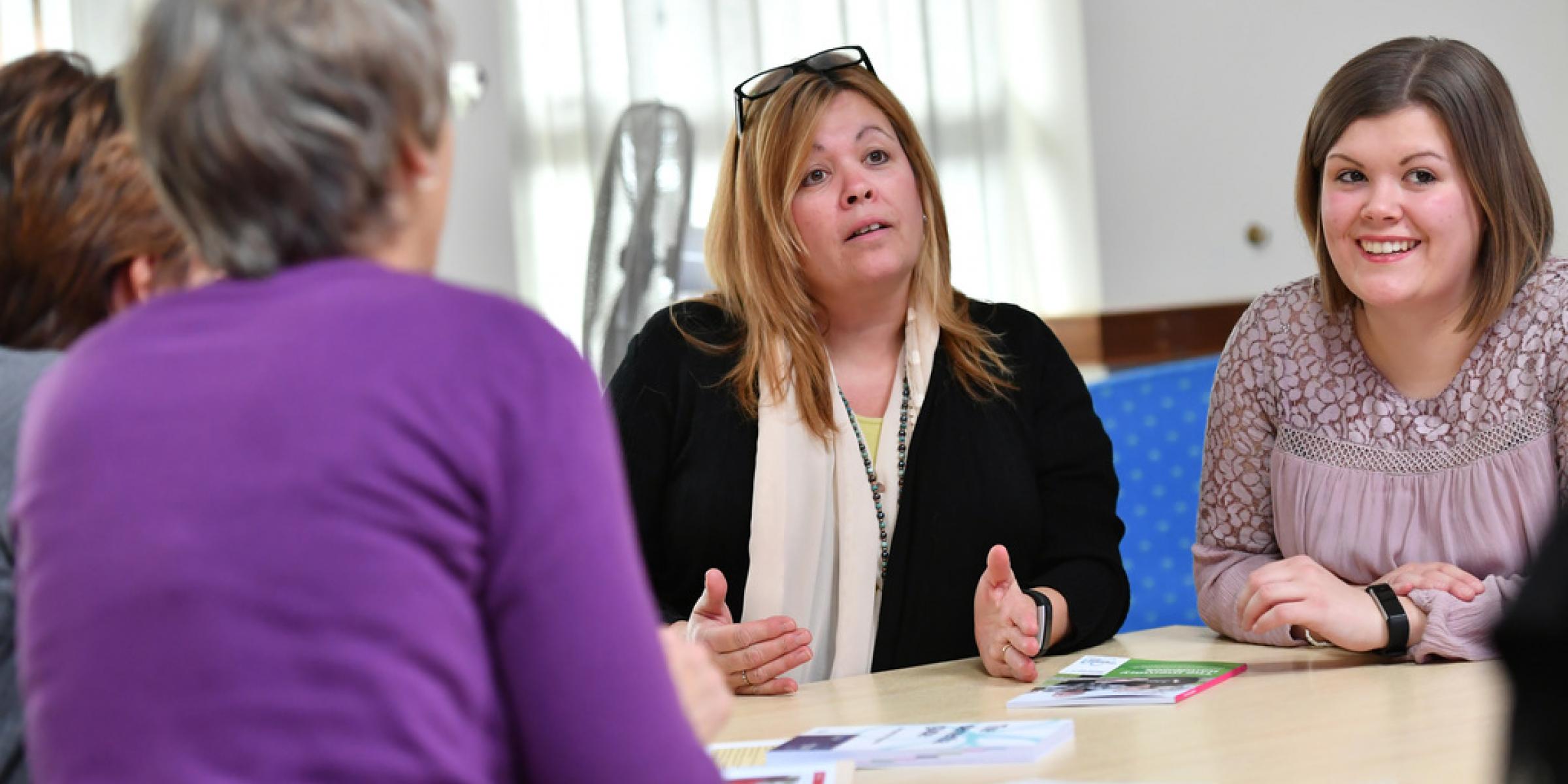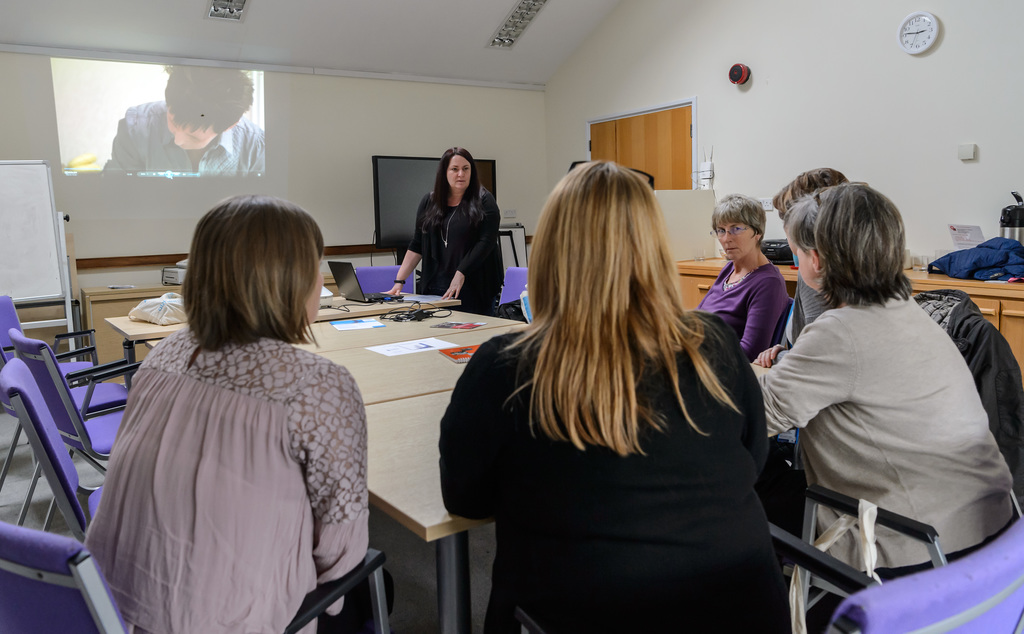
Bridging a gap: Understanding learning disabilities and dementia
We visit a project that's helping people with learning disabilities who also develop dementia.
 A Dementia Friends Information Session for carers of people with learning disabilities
A Dementia Friends Information Session for carers of people with learning disabilities
People with a learning disability have an increased risk of dementia. In particular, one in three people with Down's syndrome aged over 50 will develop dementia, and they are more likely to do so before age 50.
Our Learning Disability and Dementia project is supporting people in Herefordshire affected by both a learning disability and dementia.
It has been raising awareness and understanding, preparing people living and working with learning disabilities for the changes that dementia can bring, promoting useful resources and helping to join up relevant services.
'We didn't seem to see or hear about people with a learning disability - they were a "hard to reach" group for us,' says project manager Ginnie Jaques.
'I realised that people didn't have support or understanding - that bothered me.'
Adapted resources
Tracey Exell, a Dementia Adviser, has begun delivering Dementia Friends information sessions to people with a learning disability, using adapted resources created in partnership with MacIntyre, a learning disabilities charity.
'The group weren't scared or worried. They were glad that dementia was given a name and explained,' she says.
Tracey also holds Dementia Friends sessions for family carers of people with a learning disability who also have dementia, and for care staff who work with them.
These form part of wider discussions about the needs of people with both a learning disability and dementia, which also include viewing a short film.
Attendees include carers from a local Shared Lives scheme, who welcome adults with learning disabilities and other needs into their own homes, providing support as well as housing.
'There was a gap when my carers asked for dementia training,' says Dave Davies, Shared Lives Manager in Herefordshire.
'I could have sent them on a one-day course, but Tracey coming in with specific information has been very helpful. They were learning things that they could put into practice right there and then.'
Learned so much
As part of Shared Lives, Paige Talbot and her mother Lesley Howarth care for two women age 45 and 60 with learning disabilities and Alzheimer's disease.
'Tracey's session is very good, you get such a lot out of it,' says Paige.
Lesley says, 'It's very enlightening. I've watched the film twice and picked up new things the second time.'
'I don't know how we managed before - we've learned so much,' says Lesley.
Away from the sessions, Tracey is always on hand to offer advice, information and support. Lesley says their increased understanding means they can reassure the women in situations that could be distressing.
'I don't know how we managed before - we've learned so much,' says Lesley.
Paige agrees that they've picked up new strategies for dealing with the effects of dementia.
'Our patience has helped them to be more relaxed,' says Paige. 'We have learned to distract them or take them to another place.'
Tracey also suggested loading information about both women onto an iPad, so that useful details can be shared easily between home and staff at Aspire, the community hub they attend.
'It makes everything very transparent,' says Paige. 'If they're having a bad day, we can tell why - maybe their routine has changed.'
Port in a storm
Another of the newly created Dementia Friends is Louise Macintyre, whose brother Peter has learning difficulties. Peter may also have dementia - his family and care home staff are awaiting MRI scan results after noticing behavioural and physical changes.
'The project is providing so much support for myself, Peter and everyone at his care home,' says Louise.
'It has come just at the right time for him - it's been a real port in a storm. They have given us so much information.'
Tracey has also worked with Peter's family to create a life story book, made up of family photos.
'They are getting to know Peter really well,' says Louise.
The project is also creating dementia-friendly support plans for people with a learning disability, taking into account their choices now and in the future.
Get people talking
Some people with a learning disability are also becoming Dementia Friends Champions - people who deliver Dementia Friends information sessions.
The first is Tracy Crum (pictured above), who recently completed her training.
'I hope more people with a learning disability will become a Dementia Friends Champion,' says Tracy.
'I decided to become a champion because I want to help people understand dementia,' she says.
'I hope more people with a learning disability will become a Dementia Friends Champion, and that other people who work with a learning disability will understand what people with learning disabilities and dementia are going through.
'I love being part of the project and want to make a difference.'
The team behind the project feel positive about its impact so far.
'People are living better, they've made changes,' says Tracey. 'Families were quite confused and didn't know how to support a person, but now things are calmer.'
Ginnie is pleased that people who were not aware of Alzheimer's Society now have a source of dementia support.
'We're breaking down the fear and getting people talking about it,' she says.
Next steps
- See our Easy Read factsheets, What is dementia? (ER1) and Supporting a person with dementia (ER2), designed for people with learning disabilities.
- Become a Dementia Friend or Dementia Friends Champion.
- Get information about dementia-friendly communities.


